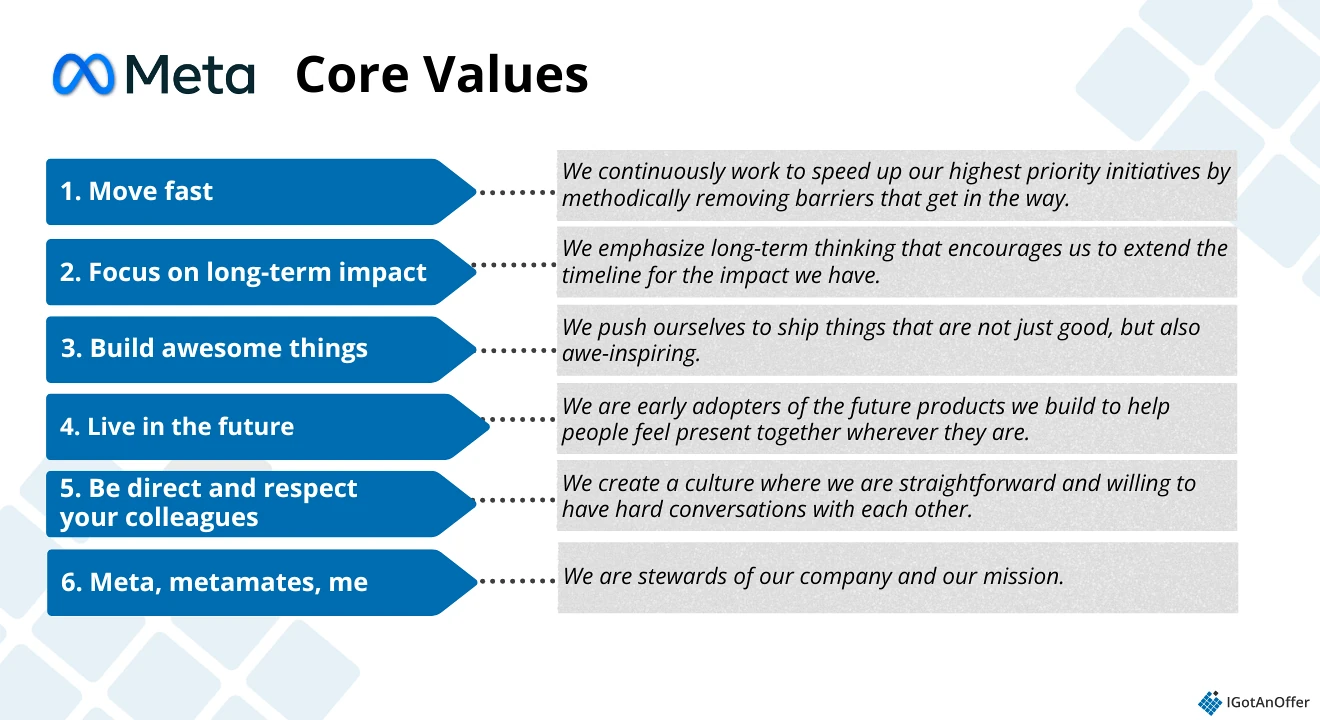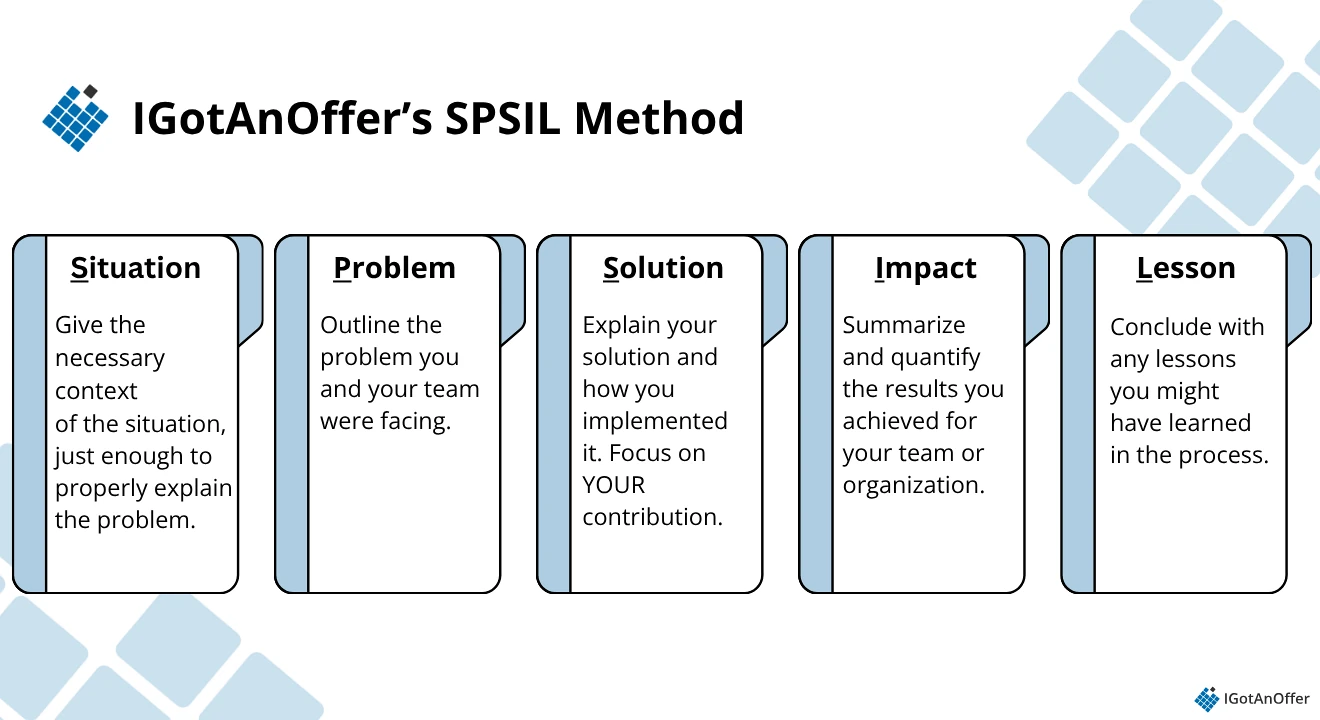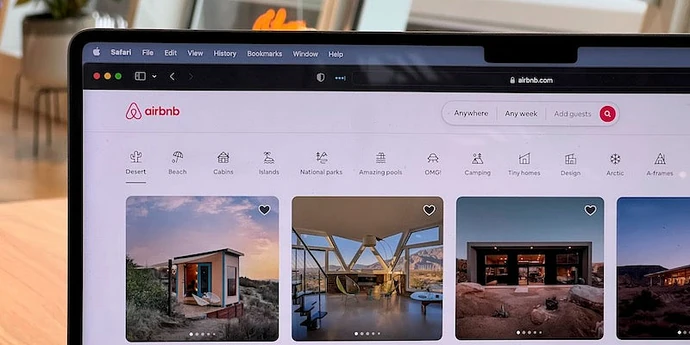If you’re applying for a tech role at Meta, the behavioral round, sometimes called the "leadership interview," is one of the main types of interviews you’re going to need to crack. As the questions may not seem difficult when compared with their technical counterparts, candidates frequently overlook them.
However, these open-ended questions are important for interviewers to find out if you’re a good fit for Meta. So you’ll want to prepare for these questions and use them to distinguish yourself from other candidates.
To help you, we’ve created this interview prep guide to give you everything you need to know to prepare for Meta’s behavioral interview, including example questions, how to answer, and a practice plan to make sure you land your dream job at Meta.
Here’s a brief overview of what we’ll cover:
- What is a behavioral interview at Meta?
- Meta behavioral interview questions
- How to answer Meta behavioral interview questions
- How to prepare for a Meta behavioral interview
Click here to practice 1-on-1 with Meta ex-interviewers
1. What is a behavioral interview at Meta?
Meta uses behavioral interviews to assess job candidates based on their past experiences. These questions typically start with “Tell me about a time you…” and focus on soft skills such as: leadership, communication, teamwork, problem solving, etc.
You may have a specific interview dedicated to behavioral questions - if so, it's often called the Meta leadership and drive interview.
To round out your preparation, we've also included some resume, HR, and hypothetical questions such as "what are your strengths and weaknesses?" or "how would you...?" in this article. As these are real questions that have been reported by past candidates, we want to make sure you're ready for anything.
These questions will appear at every step of the interview process, from the initial recruiter phone screen, through the hiring manager, and all the way through to the onsite interviews. They may even appear as icebreakers or transition questions during system design or coding interviews. The frequency and type of behavioral questions will vary, but be prepared for many, especially if you're applying for a leadership role.
For more information on the process for a specific role, consult one of our comprehensive interview guides below:
- Meta software engineer interview
- Meta product manager interview
- Meta rotational product manager interview
- Meta product marketing manager interview
- Meta product designer interview
- Meta program manager interview
- Meta technical program manager interview
- Meta engineering manager interview
- Meta data engineer interview
- Meta production engineer interview
- Meta front-end engineer interview
- Meta machine learning engineer interview
- Meta data scientist interview
- Meta research scientist interview
- Meta account manager interview
- Meta E5 interview
- Meta E6 interview
- Meta research engineer interview guide
Now, what will your interviewers be looking out for?
1.1 Meta's core values

To get an idea of the qualities your interviewers are looking for during behavioral interviews, review Meta's six core values:
Meta's six core value
1. Move fast
We build and learn faster than anyone else. Acting with urgency, we don’t wait until next week to do something we could do today. We continuously work to speed up our highest priority initiatives by methodically removing barriers that get in the way. It’s about moving fast in one direction together–as a company and as individuals.
2. Focus on long-term impact
We emphasize long-term thinking that encourages us to extend the timeline for the impact we have, rather than optimizing for near-term wins. We should take on the challenges that will be the most impactful, even if the full results won’t be seen for years.
3. Build awesome things
We push ourselves to ship things that are not just good, but also awe-inspiring. We’ve already built products that are useful to billions of people. In our next chapter, we’ll focus more on inspiring them as well, in everything we do.
4. Live in the future
Let’s build the future of work that we want, with an in-person focus designed to support a strong, valuable experience for our people who have chosen to work from the office, and a thoughtful and intentional approach to where we invest in remote work. This also means being early adopters of the future products we build to help people feel present together wherever they are.
5. Be direct and respect your colleagues
We create a culture where we are straightforward and willing to have hard conversations with each other. At the same time, we are also respectful and when we share feedback, we recognize that many of the world’s leading experts work here.
6. Meta, metamates, me
We are stewards of our company and our mission. We have a sense of responsibility for our collective success and to each other as teammates. It’s about taking care of our company and each other.
These values aren't just marketing spiel, as one of our Meta coaches confirms:
"Meta is an amazing place to work. You get to work with amazing engineers, designers, data scientists and much more. They have an unparalleled experimentation platform (in my opinion), and also move faster than any company I have ever worked at." Mark R, former Meta and Google PM turned coach.
So, while practicing your responses to the example questions in this article, choose stories that reflect these six values.
In the next section, we’ll take a deep dive into some of Meta’s top behavioral questions so that you can get an idea of what you’re up against.
2. Meta behavioral interview questions
Now that you’ve got an idea of what to expect during the Meta interview process, let’s jump into some example questions.
To help you prepare strategically for your job interview, we have used Glassdoor data to identify the real questions asked in different Meta interviews. The questions we’ve chosen come from our research on five Meta tech roles: product manager, software engineer, program manager, product designer, and data scientist.
You’ll notice that we’ve divided the questions into the following categories:
- General
- Teamwork
- Leadership
- Role-specific
We've added these categories to make the list of questions easier to understand, starting with the general questions that apply to any job. Each category tests a different quality that Meta is looking for in its candidates, and the frequency of each question type will vary depending on the role. For instance, interviews for managerial roles will include a higher number of leadership questions.
2.1 Meta behavioral questions: General
First up are the general behavioral questions that may come up for any role. Here your interviewer is looking for an overall view of your past experiences and how you will perform as an employee at Meta. You’ll see that regardless of the role, Facebook is curious about your resume, your motivations, how you handle difficult situations, and why you want to work for them specifically.
These are good questions for you to demonstrate your alignment with Meta’s core values. Show your willingness to take risks, lessons learned from past mistakes, a bias for action, and other qualities that Meta is looking for in a candidate.
Practice demonstrating those values using the questions below.
Example behavioral questions asked at Meta: General
- Why Meta?
- Why this position?
- Tell me about yourself / your past experience
- Tell me about a past challenge or conflict you handled
- Tell me about your skills and interests
- Tell me about the greatest accomplishment of your career
- Tell me about a time you failed and what you learned from it
- Tell me what others would say about you
- Tell me about your biggest accomplishment
- Tell me about the area where you have the most to learn
- Tell me about what do you want to do in the future
- What are your strengths and weaknesses?
- Walk me through your resume
- Why are you transitioning from your current position?
- What makes a good [job title] / bad [job title]?
2.2 Meta behavioral questions: Teamwork
Many employees at Meta have to work in cross-functional teams with other software engineers, program managers, product managers, etc. So you’ll need to be able to communicate clearly, work with others efficiently, and build trust and relationships.
Your interviewer will be looking for you to share stories from your past experience that demonstrate openness, collaboration, and partnership. Give it a try using the following questions.
Example behavioral questions asked at Meta: Teamwork
- Tell me about a time you struggled to work with one of your colleagues
- Tell me about a time you were given feedback that was constructive
- Tell me about a time you had to resolve a conflict in a team
- Tell me about a time you managed a conflict/disagreement between stakeholders
- Tell me about a time you worked with cross-functional teams and the role you played
- Have you ever collaborated with multiple teams? What challenges did you face?
- How large was the team you were working on?
- Who else did you work with when you were doing X?
2.3 Meta behavioral questions: Leadership
In addition to employees with a collaborative nature, Mea is looking for employees who are able to motivate their team, resolve conflicts, drive alignment, and build relationships. This is because most roles will involve not only working in teams, but also leading them when appropriate. Meta has a bottom-up culture of leadership, which makes leadership a crucial quality for any hire.
This would be a good time to show that you’ve got drive and empathy, particularly if you're interviewing for a manager role. Some of the leadership skills that Meta is looking for in these questions include how you earn trust and take ownership, process and grow from past experiences, support the people around you, and overcome difficult situations.
Example behavioral questions asked at Meta: Leadership
- Tell me about a time you led a team
- Tell me about a time you had to step up and take responsibility for others
- Tell me about your worst boss and why they were bad
- How would you advocate for a commitment to a priority, when that priority is not high on someone else's list?
- How would you manage timelines in a highly matrixed environment, where there is no top down authority?
2.4 Meta behavioral questions: Role-specific
Our last category focuses on the questions that are specific to certain roles, such as “what made you get into design?” for product designers. While you should expect a combination of each of the previous four categories in any interview, the following questions apply most to data scientists, product managers, product designers, and software engineers.
Right, now let’s get into some questions.
Example behavioral questions asked at Meta: Role-specific
- Tell me about a recent / favorite project and some of the difficulties you had
- Tell me about a product you lead from idea to launch (product manager)
- Tell me about a time you struggled on one of your software projects (software engineer)
- Tell me about a data and analytics project you've worked on (data science)
- Tell me about what made you get into design (product designer)
- How do you influence product? (product manager)
- Which part of the design process interests you most? (product designer)
- Why do you want to be a product designer rather than a UX researcher? (product designer)
3. How to answer Meta behavioral interview questions
Now that you’ve seen some of Meta’s top questions, let’s work on a technique for answering them.
3.1 Technique
When answering behavioral questions, you should focus on your most relevant achievements and communicate them in a clear way. An easy way to achieve this is to use a step-by-step method to tell your stories.
The STAR method (Situation, Task, Action, Result) is a popular approach for answering behavioral questions because it’s easy to remember. You may have already heard of it. However, we’ve found that candidates often find it difficult to distinguish the difference between steps two and three, or task and action. Some also forget to include lessons learned in the results step, which is especially crucial when discussing past failures.
So we’ve developed the IGotAnOffer method to correct some of the pitfalls we’ve observed when using the STAR method.
3.1.1 The IGotAnOffer SPSIL (Situation, Problem, Solution, Impact, Lessons) method

Let’s step through our suggested five-step approach:
- Situation: Start by giving the necessary context of the situation you were in. Describe your role, the team, the organization, the market, etc. You should only give the minimum context needed to understand the problem and the solution in your story. Nothing more.
- Problem: Outline the problem you and your team were facing.
- Solution: Explain the solution you came up with to solve the problem. Step through how you went about implementing your solution, and focus on your contribution over what the team / larger organization did.
- Impact: Summarize the positive results you achieved for your team, department, and organization. As much as possible, quantify the impact.
- Lessons: Conclude with any lessons you might have learned in the process.
You’ll notice that this method covers very similar themes to the STAR method. We like it because a lot of the candidates we work with find this framework easier to use, as there’s no overlap between any of the steps in your story.
For a deeper dive into this topic, check out our article on why the STAR method isn’t always the best for behavioral interviews and how IGotAnOffer's SPSIL method can be a better option. It was written with product managers in mind, but applies just as well to any role.
Ultimately, you should practice using whatever method you’re the most comfortable with. If you’d like to start practicing right away, jump back to the full list of questions here.
Otherwise, to get a better idea of how our method works, work through the example below.
3.2 Example: Tell me about a past challenge or conflict you handled
Now that you know some approaches for answering behavioral questions, let's look at a full example. We’ll use one of Facebook’s most frequently asked questions.
Try answering the question below following your preferred method. Play both the role of the interviewer and the candidate. Write down your answer, then practice saying it out loud before going through our example response. Once you’ve finished, compare your response to our example to fill in any gaps in your story.
Try this question:
Tell me about a past challenge or conflict you handled
Answer:
We’ll use the IGotAnOffer method described above and answer as if interviewing for a Product Manager job at Meta. You will find our proposed answer to the question below.
Notice that the question asks for a past challenge OR conflict, which lets you choose what you’d like to highlight in your answer. If you choose a past conflict you resolved, this would be a good way to show off your interpersonal and collaboration skills. However, in this case, we’ve chosen to focus on a past challenge, which we’ll use to display leadership and problem-solving skills.
For a sample answer to the past conflict interview question, take a look here.
1. Situation
Note that this question isn’t necessarily about a specific role and allows you to describe a variety of situations. We’ll use an example from working at a coffee shop, but you should of course use an example from your own work experience.
You could start by saying something like, “When I was in college I was a barista at a 30-year-old, local coffee shop called Sunny’s. It was a small business with less than ten employees, resistant to change, and located in a neighborhood with new shops and restaurants opening at a rapid pace. It was also starting to lose regular customers and revenue.”
Without giving too much detail, this gives a quick sense of the setting for the challenge you faced and the solution you’re about to describe.
2. Problem
Once you outline the situation, you can explain the problem by saying something like, “The challenge was that we didn’t know why the shop was losing customers, and the owner was trying all kinds of different promotions that weren’t working.”
You have spent very few words between describing the situation and problem, but your answer so far has given the interviewer a clear sense of the setting and challenge you faced.
3. Solution
When describing the solution you came up with to solve the problem, it’s important to step through your thinking. And it’s especially important to focus on YOUR contribution.
You could say something such as, “I was only a barista and had no stake in the business, but wanted the shop to succeed given its history in the neighborhood. So I decided to find an easy way to understand the market and find some of the root-causes of the problem we were experiencing. My first step was to informally survey customers about their coffee habits as they paid for their order. This gave me insight into what other shops were popular and what people liked about them. Next, I stopped by some of the other shops on my way to work, looking for what they might be doing differently.
“I noticed a few common themes at these other popular shops: 1) They offered soy and almond as alternatives to dairy milk, 2) they emphasized fair trade coffee, and 3) they printed the WiFi password on receipts.
“I mentioned these themes to the owner and helped to prioritize easy, low-cost solutions. First, buying a few cartons of soy and almond milk allowed us to test if this made a difference to Sunny’s customers without requiring a big investment. Second, all of the coffee that Sunny’s sold was already fair trade, but this wasn’t advertised; so I helped make a few signs to explain and placed them around the store. Third, we realized that printing the password on receipts was too cumbersome of a change, so instead I trained all baristas to ask customers if they wanted the WiFi password after they paid for their order.”
Let’s take a step back and look at all of the different behavioral and product skills you’ve highlighted with this answer. It emphasizes your leadership drive, as you were trying to solve a problem even when it wasn’t your direct responsibility.
Also, one of Meta’s core values is “Focus on Impact,” or acting to solve the most important problems. This answer demonstrates that, as you found low-cost and innovative ways to solve a big problem despite the limited resources of the company.
4. Impact
After explaining the actions you took, it’s a good idea to quantify how much impact you had.
You could say something like, “So what I did wasn’t all that complex. I asked customers about their preferences, conducted some basic competitive analysis, helped to establish low-risk innovations by brainstorming solutions with the owner, and trained staff on the changes. After these changes, sales returned to normal within a couple months. Seeing this, the owner started more regularly surveying customers and executing competitive analysis, which has helped to make Sunny’s one of the top coffee shops in the neighborhood to this day.”
5. Lessons
Finally, wrap up your answer by describing any lessons you might have learned.
You could say, “This all happened before my professional career really started, but it taught me that the most innovative solutions are not always radical or expensive. It’s also a great reminder that understanding customer needs is crucial when trying to innovate in any business.”
3.3 Watch video example
Now you've seen how the framework on paper, let's see how it looks in a real interview situation. Check out how Damien (ex-Meta PM) uses the framework in his answers 2-5 in the video below.
4. Tips to impress your interviewer
Finally, before we move on to some interview preparation resources, we'd like to give you five helpful tips to keep in mind.
Tip #1: Get used to setting up the situation in 30 seconds or less
Use a timer while you practice to ensure you provide only necessary information. Spending too much time on the Situation step is one of the most common mistakes candidates make.
Tip #2: Stay focused on essential details
Interviewers hear a lot of behavioral stories a day. If you go into unnecessary details you are likely to lose their attention. Share your stories with a few different people before your interview and ask them what details they would suggest cutting.
Tip #3: Be proud and talk about YOU
This is not the time to be shy about your accomplishments. Concentrate on your impact, not what “the team” did. Not talking about YOU enough is another common mistake we see with a lot of candidates.
Tip #4: Adapt to follow up questions
Don’t be alarmed if your interviewer asks follow up questions; this is perfectly normal. Listen carefully to the way your interviewer is asking these questions, as there will often be a subtle clue about the specific skills they’re looking to assess from the next part of your answer.
Tip #5: Explain how failure made you better
When talking about failure, don’t try to hide your mistakes or frame a weakness as a strength. Instead, show what you learned and how you grew from the failure.
5. How to prepare for a Meta behavioral interview
Practicing by yourself will only take you so far. One of the main challenges of behavioral interviews is communicating your different answers in a succinct and clear way.
5.1 Learn about Meta’s company culture
Most candidates fail to do this. But before investing tens of hours preparing for an interview at Meta you should take some time to make sure it's actually the right company for you.
Meta is prestigious and it's therefore tempting to ignore that step completely. But in our experience, the prestige in itself won't make you happy day-to-day. It's the type of work and the people you work with that will.
If you know employees who work at Meta or used to work there, it's a good idea to talk to them to understand what the culture is like. You can also check out our article on what a real Meta interview experience is like. Otherwise, here are some resources to help you get started:
- Meta's 6 core values (by Meta)
- Facebook’s “hacker culture” (by Mark Zuckerberg, via Wired)
- Meta annual reports and strategy presentations (by Meta)
- Meta's approach to tech trends (by CB Insights)
- Meta org culture analysis (by Panmore Institute)
5.2 Practice by yourself
Acing a behavioral question is much harder than it looks. You’ll stand out if you put in the required work to craft concise and direct answers.
5.2.1 Write down your stories
First, work out which stories you’d like to tell. Make a list of key moments in your career (e.g. accomplishments, failures, team situations, leadership situations, etc.) that you can use to answer one or multiple questions. Take a look at Meta’s core values and find at least one story from your past that exemplifies each one.
After you’ve finished your list, write out a story for each key moment in your career using the structure we've laid out in section 3. Be sure to emphasize your impact in each of these examples, quantify the results of your actions, and explain the lessons you learned from the experience.
Once you have a bank of stories, go through the questions in section 2 and make sure you’d be able to answer all of them either by using one of the stories you’ve written directly, or by adapting it on the fly. If you identify any gaps, add stories to your bank until you’re comfortable you can cover all the questions listed in this article.
Click here to practice with more common behavioral questions and see example answers
5.2.2 Practice your stories out loud
After you've written everything down, a great way to practice your answers is to interview yourself out loud. This may sound strange, but it will significantly improve the way you communicate during an interview.
You should be able to tell each story naturally, neither missing key details nor memorizing them word-for-word.
Play the role of both the candidate and the interviewer, asking questions and answering them, just like two people would in an interview. Trust us, it works.
Prepping for behavioral interviews at a different tech company? You may wanna check our other behavioral interview guides for FAANG+ companies:
- Apple behavioral interview
- Google behavioral interview
- Amazon behavioral interview
- 40+ Most Common Behavioral Interview Questions
- 8 Most-Asked Product Manager Behavioral Interview Questions
- 11 Most-Asked Software Engineer Behavioral Interview Questions
5.3 Do mock interviews
Practicing by yourself will only take you so far. One of the main challenges of behavioral interviews is communicating your different answers in a succinct and clear way.
As a result, we strongly recommend practicing with a peer interviewing you. If possible, a great place to start is to practice with friends. This can be especially helpful if your friend has experience with behavioral interviews, or is at least familiar with the process.
5.3.1 Mock interviews with real Meta ex-interviewers
Finally, you should also try to practice behavioral mock interviews with expert ex-interviewers, as they’ll be able to give you much more accurate feedback than friends and peers.
If you know an ex-interviewer from Facebook/Meta who can help you, that's fantastic! But for most of us, it's tough to find the right connections to make this happen. And it might also be difficult to practice multiple hours with that person unless you know them really well.
Here's the good news. We've already made the connections for you. We’ve created a coaching service where you can practice 1-on-1 with ex-interviewers from Meta and other top tech companies. Learn more and start scheduling sessions today.















